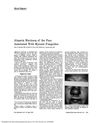TLDR Benign follicular mucinosis involves immune cells attacking hair follicles.
The study on two patients with benign follicular mucinosis (FM) revealed degenerative changes in the follicular outer root sheath and sebaceous gland epithelium, accompanied by benign inflammatory cell infiltration. Using light and electron microscopy, researchers observed associations between disattached keratinocytes, macrophages, and Langerhans cells. Immunofluorescence detected complement (C3) and fibrinogen/fibrin in degenerated areas, while immunoperoxidase studies indicated increased T cells, macrophages, and Langerhans cells in the affected follicular epithelium. These findings suggested that cell-mediated immune mechanisms might have contributed to the pathogenesis of FM.
 28 citations
,
May 1978 in “Archives of dermatology”
28 citations
,
May 1978 in “Archives of dermatology” Alopecia mucinosa on the face can be linked to mycosis fungoides, a type of lymphoma.
11 citations
,
June 1974 in “Journal of Cutaneous Pathology” Follicular mucinosis causes significant damage to hair follicle cells.
186 citations
,
October 1957 in “A M A Archives of Dermatology” Alopecia mucinosa is a challenging condition with unclear diagnosis and treatment.
 December 2013 in “Research Portal (King's College London)”
December 2013 in “Research Portal (King's College London)” Hair loss in Lichen Planopilaris is caused by immune system issues damaging hair follicles and stem cells.
 150 citations
,
October 2010 in “The American Journal of Pathology”
150 citations
,
October 2010 in “The American Journal of Pathology” The document concludes that more research is needed to better understand and treat primary cicatricial alopecias, and suggests a possible reclassification based on molecular pathways.
38 citations
,
January 2017 in “PPAR Research” PPAR-γ helps control skin oil glands and inflammation, and its disruption can cause hair loss diseases.
 15 citations
,
July 1999 in “Dermatologic Clinics”
15 citations
,
July 1999 in “Dermatologic Clinics” The document concludes that immune system abnormalities cause alopecia areata, but the exact process is still not completely understood.
 44 citations
,
November 2011 in “The Journal of Dermatology”
44 citations
,
November 2011 in “The Journal of Dermatology” New understanding of the causes of primary cicatricial alopecia has led to better diagnosis and potential new treatments.




